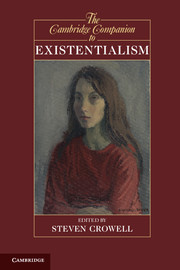Book contents
- Frontmatter
- I Introduction
- II Existentialism in Historical Perspective
- III Major Existentialist Philosophers
- 4 Kierkegaard’s single individual and the point of indirect communication
- 5 “What a monster then is man”: Pascal and Kierkegaard on being a contradictory self and what to do about it
- 6 Nietzsche: after the death of God
- 7 Nietzsche: selfhood, creativity, and philosophy
- 8 Heidegger: the existential analytic of Dasein
- 9 The antinomy of being: Heidegger’s critique of humanism
- 10 Sartre’s existentialism and the nature of consciousness
- 11 Political existentialism: the career of Sartre’s political thought
- 12 Simone de Beauvoir’s existentialism: freedom and ambiguity in the human world
- 13 Merleau-Ponty on body, flesh, and visibility
- IV The Reach of Existential Philosophy
- Bibliography
- Index
- OTHER VOLUMES IN THE SERIES OF CAMBRIDGE COMPANIONS
11 - Political existentialism: the career of Sartre’s political thought
from III - Major Existentialist Philosophers
Published online by Cambridge University Press: 28 March 2012
- Frontmatter
- I Introduction
- II Existentialism in Historical Perspective
- III Major Existentialist Philosophers
- 4 Kierkegaard’s single individual and the point of indirect communication
- 5 “What a monster then is man”: Pascal and Kierkegaard on being a contradictory self and what to do about it
- 6 Nietzsche: after the death of God
- 7 Nietzsche: selfhood, creativity, and philosophy
- 8 Heidegger: the existential analytic of Dasein
- 9 The antinomy of being: Heidegger’s critique of humanism
- 10 Sartre’s existentialism and the nature of consciousness
- 11 Political existentialism: the career of Sartre’s political thought
- 12 Simone de Beauvoir’s existentialism: freedom and ambiguity in the human world
- 13 Merleau-Ponty on body, flesh, and visibility
- IV The Reach of Existential Philosophy
- Bibliography
- Index
- OTHER VOLUMES IN THE SERIES OF CAMBRIDGE COMPANIONS
Summary
As a student in the lycée, the young Sartre did not show a serious interest in political theory or in practical politics generally. His natural tendencies were anarchic. But his close friend and classmate at the École Normale Supérieure, Paul Nizan, joined the Communist Party (PCF) at age twenty-three (a decision Sartre considered shocking [monstre]). Sartre's interests were more literary and philosophical than political at that time. He resisted the siren call of socialism, for example, that had turned the heads of many of his classmates at the École, including Raymond Aron. Eschewing party adherence, as he would the rest of his life, Sartre nonetheless was strongly opposed to colonialism, which he regarded as a sordid form of state takeover. Sartre harbored a basic egalitarian spirit from his early teens and, as he recalls, thought of the French control of Algeria whenever the injustice of colonialism came to mind (Cér., p. 478). As his life-long companion Simone de Beauvoir remarks, they showed little concern for politics after graduation and did not even vote in the critical general election of 1936 that ushered in the socialist program of the Front populaire. But even in those years, as Sartre assures us, his “heart was on the Left, of course, like everyone else's.”
STUDENT, SCHOLAR, TEACHER (1915–1939)
Although he came under the influence of the charismatic pacifist professor known as Alain at the Lycée Henri IV, Sartre's own pacifism seems to have been rather short-lived and superficial. By the time he entered military service during the “Phony War” of 1939–40, Sartre had all but shed those inclinations in the face of the Nazi attack. Still, in his War Diaries he records on several occasions the tension at play in his personal life between the Stoicism that had attracted him in college, which Sartre associated with Alain’s pacifi st arguments, and his personal quest for authenticity.
- Type
- Chapter
- Information
- The Cambridge Companion to Existentialism , pp. 227 - 251Publisher: Cambridge University PressPrint publication year: 2012
- 1
- Cited by



